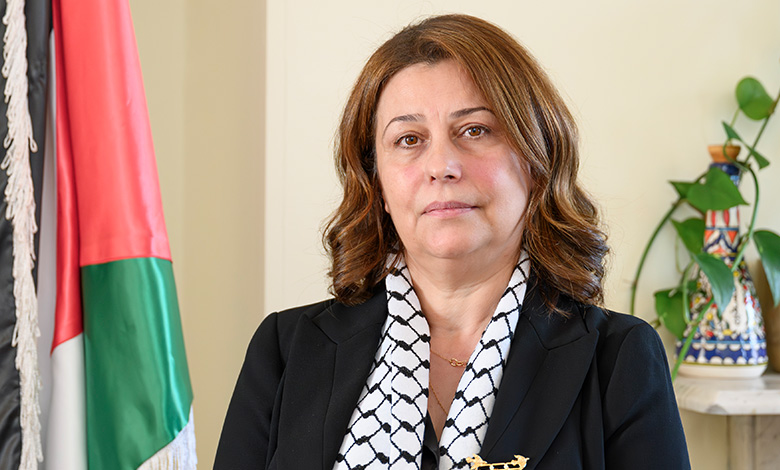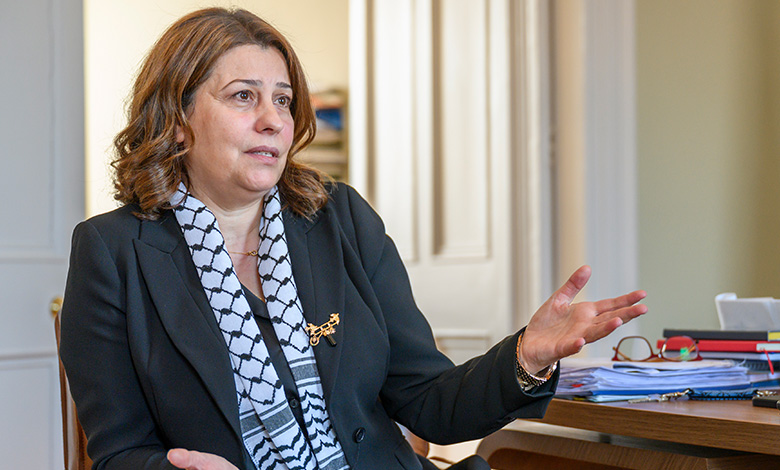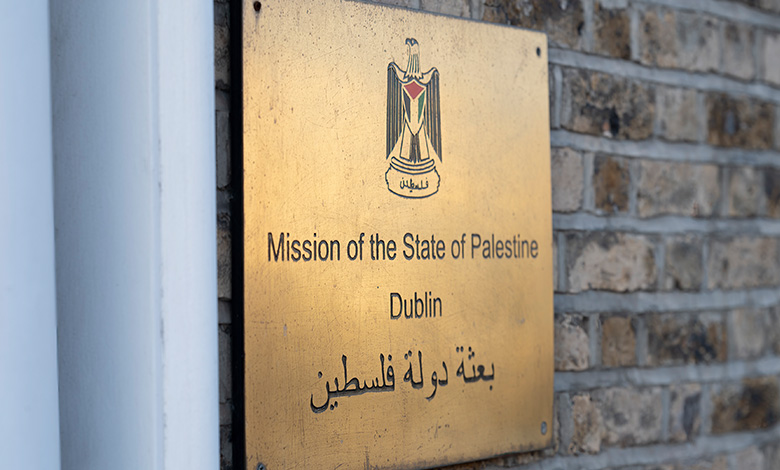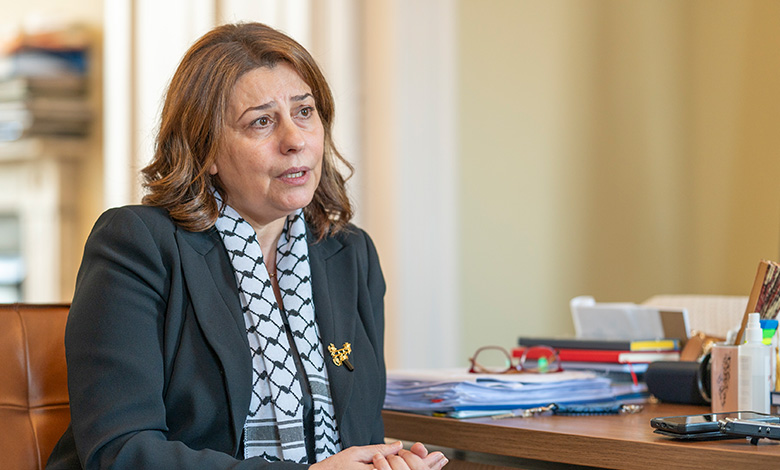100 days: Ambassador of the State of Palestine to Ireland

Exactly 100 days after Israel’s bombardment of the Gaza Strip began and 80 days after its ground invasion commenced, Ciarán Galway sits down with Ambassador of the State of Palestine to Ireland – and Gazan native – Jilan Wahba Abdalmajid.
Steam spills into the stillness of Leeson Street from a row of Georgian townhouses, one of which hosts the Embassy of Palestine. It is a perfect winter’s morning by Dublin standards – almost cloudless blue skies, a piercing low sun, and an icy bite in the air. It is a world away from Gaza where the haze shrouding its streetscapes is a noxious mix of pummelled concrete dust, smoke, and death.
Unsurprisingly, given the timing, the Ambassador of the State of Palestine is unsmiling. Yet, as she dons her keffiyeh, she still extends a genial welcome into her office.
Born in Gaza as an internally displaced refugee, Wahba Abdalmajid began her diplomatic service as an assistant chief of protocol with the Palestinian Ministry of Foreign Affairs and Expatriates (MOFAE) in 1995, followed by a posting to Cyprus, where she completed a PhD.
Acknowledging her love of the job from day one, she remembers the early challenges of establishing a new government department: “We all worked together. There were no positions at that time. We worked for 24 hours a day. There was no time limit,” adding: “I engaged more with the President’s Office; with Abu Ammar [then-President Yasser Arafat]. That was the first opportunity that I had to engage with or see him face to face. It was a dream that all Palestinians used to have. ‘Am I going to see Abu Ammar?’ I saw him. I attended meetings with him. The journey started there.”
Bilateral relations
Tasked with advancing bilateral relations and strengthening the ties between the governments and people of Palestine and Ireland, the Ambassador is cognisant of the “long relations between the Irish people and the Palestinians”.
“Historically, the relations between Palestinians and Irish have always been strong,” she says, adding: “We share the same history of colonisation. When I discuss colonisation, occupation, oppression, and starvation, the Irish people understand what I am talking about.”
Describing the diplomatic ties as a practical manifestation of this relationship, the Ambassador describes her experience in collaborating across the political spectrum. “Since I arrived here in Ireland, I have been welcomed in every aspect, from the normal people to the Government, and the different parties. We have found a warm welcome in Ireland. That gives us a space,” she says.
“Palestine, if I can say it, unifies all the Irish, whether from the Government or the opposition. Usually, when you are a diplomat in any country, you have to be careful, but here in Ireland we are confident because we are talking about an area [of policy] that both the Government and the opposition have the same kind of thoughts.”
Palestinian Authority
Established in 1994, the Palestinian Authority (PA) is a provisional government, established under the Oslo Accords. Assuming the role previously held by the PLO as the official voice of Palestinians, the PA was given a five-year lifespan, but it still in existence 26 years after this deadline.
As a representative of the PA, the Ambassador insists: “The Palestinian Authority represents all the Palestinians. We came together under the umbrella of the PLO which signed the Oslo Accords. Our governments have people from the right, the left, and the middle. The Fatah movement, the Palestinian Democratic Union, and most of the factions of the PLO are represented in the Palestinian Authority.”
However, to date, the PA exerts only partial control of the Palestinian territory, with large sections of the West Bank controlled by illegal Israeli settlers. The PA has no control of its capital, East Jerusalem, which was illegally annexed by Israel in 1980 and, along with West Jerusalem, is claimed by Israel as a ‘unified’ capital. Beyond the West Bank, Gaza has been administered by Hamas since June 2007.
Despite these challenges, from 1995 until today, the Ambassador states, the PA has endeavoured to build the foundational institutions of the State of Palestine.
“We have institutions in East Jerusalem. This is how the Palestinian Authority has worked and will continue to work,” she outlines, while insisting: “Over time, the Israelis deliberately weakened the Palestinian Authority.”
Elections and Hamas
In the January 2006 Palestinian Legislative Council (PLC) election, Hamas won a significant majority of seats (74/132). Since the Fatah-Hamas war in 2007, the outbreak of which prompted the collapse of the unity government after less than three months, the West Bank has been under a state of emergency.
General elections have not taken place in Palestine since, and while Mahmoud Abbas’ presidential term expired in 2009, he remains in office as the acting president of the Palestinian Authority.
“When I discuss colonisation, occupation, oppression, and starvation, the Irish people understand what I am talking about.”
Ambassador of the State of Palestine to Ireland, Jilan Wahba Abdalmajid
When asked about the fact that the PA is not directly elected, the Ambassador says: “The Israelis prevented the Palestinians from undertaking the normal process of elections and they did not facilitate it. That made us decide that without East Jerusalem being part of the elections, there would be no elections.”
Consequently, Gaza continues to be governed by Hamas, with senior figurehead, Ismail Haniyeh leading its government until February 2017, when he was succeeded by Yahya Sinwar, the current leader of the political and military movement. Since Hamas’ ascension to power in Gaza in 2007, Gaza has been totally blockaded – land, air, and sea – by both Israel and Egypt. Of its three access points, two are controlled by the former and one by the latter.
Asked to explain the popularity of Hamas, the Ambassador is contemplative. “The idea of resistance against the occupation in itself is very well recognised in international law,” she begins. “Being under the occupation, we have the right to resist. This right is protected under international law. The idea that Hamas built on resistance to the occupation brought support for Hamas as a faction.”
Acknowledging that “resistance is part of our culture”, she emphasises the PA’s trajectory toward “public resistance”. “We chose peace as our path, but we put resistance in a different way that works with the agreements or principles that we signed with Israel. This is a public resistance. Hamas still believes in – and the ideology of Hamas is built on – armed resistance. That is why they [Hamas] have this support among Palestinians.”
‘The day after’
Turning to the ongoing war on Gaza, which has followed the 7 October 2023 attack on Israel launched by Hamas’ armed wing, the Al Qassam Brigades, which resulted in the deaths of approximately 1,139 Israelis – including many civilians – and the capture of around 240 hostages, the Ambassador is reluctant to even contemplate ‘the day after’ the ongoing bloodshed.
“We have reached 100 days of this barbaric war against Gaza. The most important thing that all Palestinians think about is stopping this bloodshed. This is the most important thing,” she says.
“Talking about ‘the day after’, is not something that we do not think about, but first we need to stop this war… You look at Gaza and see that more than 70 per cent of the residential areas, institutions, and the health sector is totally destroyed, it is not only for the Palestinian Authority to think about by itself… Without the support of the international community… we cannot move on. We need everybody’s effort to look at the situation and talk.”
“The main goal of this war is to destroy Hamas, but Hamas – whether I agree with its ideology or not – is an idea.”
Unprecedented destruction
While preceded by the Second Intifada, Operation Cast Lead, Operation Pillar of Defense, and Operation Protective Edge in the 20th century alone, it would be a mistake to regard the latest cycle of violence in Gaza as having precedence.
Indeed, declaring war on 7 October 2023, Israeli Prime Minister Benjamin Netanyahu ordered an extensive mobilisation of military reserves and threatened that “the enemy will pay an unprecedented price”.
At the time of print, as per the Gazan Ministry of Health, 28,775 people have been confirmed killed, 68,552 wounded, and 1.8 million (80 per cent) internally displaced by Israel’s attack on Gaza. For context, from 1 January to 7 October 2023, 239 Palestinians were killed by Israel according to the UN Office for the Coordination of Humanitarian Affairs.
Meanwhile, 136 Israeli hostages remain in captivity in Gaza (after a brief ceasefire and partial hostage-prisoner exchange in late November 2023). IDF projections suggest that some 20 per cent of the remaining hostages have now been killed in ambiguous circumstances.
Commenting on the devastation unleashed upon Gaza in the name of Israeli ‘self-defence’ – including the destruction of over 60 per cent of housing units – the Ambassador is subdued: “This is a savage, barbaric war against the normal people. Around 70 per cent of the people who have been killed are women and children. And until now [today], Hamas is still there [in Gaza].
“The main goal of this war is to destroy Hamas, but Hamas – whether I agree with its ideology or not – is an idea. But they [the Israelis] did not kill the idea, they just destroyed Gaza and made it an unliveable place for the Palestinians.”
Talking about the casualties, Wahba Abdalmajid is keen to accentuate that “they are not numbers,” rather, she emphasises, they were individuals and indeed entire families, “who lived and who had stories”.
“We are talking about 25,000 orphans. There are more than 66,000 injured people; these people need hospitals, they need treatment, and only five hospitals out of 36 are working in Gaza, but not working properly. Israel destroyed the health sector. So, there is no comparison between this one [war] and the previous four wars.”
Claim of genocide
Alleging that Israel was violating its obligations under the Convention on the Prevention and Punishment of the Crime of Genocide, South Africa filed an application to institute proceedings against the State of Israel on 29 December 2023.
Public hearings on South Africa’s request for the International Court of Justice (ICJ) to indicate provisional measures to “protect against further, severe and irreparable harm to the rights of the Palestinian people” and “to ensure Israel’s compliance with its obligations” were heard via oral submissions to the ICJ on 11 and 12 January 2024 respectively.
Subsequently, on 26 January, as requested by South Africa, the ICJ indicated six provisional measures that Israel must implement under the 1948 Genocide Convention. First among these was: “The State of Israel shall, in accordance with its obligations under the Convention on the Prevention and Punishment of the Crime of Genocide, in relation to Palestinians in Gaza, take all measures within its power to prevent the commission of all acts within the scope of Article II of this Convention.”
Asked whether she believed that Israeli conduct in Gaza amounted to genocide, the Ambassador is unequivocal: “It is. If you saw and you followed the ICJ in the last couple of days, South Africa took a huge landmark decision. It is the first time
Israel has appeared in this court. It was a courageous step by South Africa.
“You could realise that it is a genocide because we witness it, and you witness it live on TV. You cannot hide it. If you want to ignore or deny it, that is your prerogative. But what is happening in Gaza now is a real genocide.”
Speaking on the relationship between South Africa and Palestine, the Ambassador observes: “We always remember Mandela’s [1997] quote that ‘We know too well that our freedom is incomplete without the freedom of the Palestinians’. Subsequent generations, and sons and daughters of Mandela, still walk his talk.”
Palestinian unity
On the prospect of revived Palestinian unity, the Ambassador speaks with candour: “I do not see that we can continue without being united. All the Palestinian factions should unite because this disaster – this catastrophe that I call Nakba 2023 – should bring all the Palestinians together. Without all of us being together, I do not think that we will move one step.”
Indicating that the PA has “never stopped talking with Hamas”, Wahba Abdalmajid reminisces on the raison d’être of the PLO. “We the Palestinians for so many years, since the PLO was created, worked together with all factions. We used to disagree with each other under the umbrella of the PLO. This will not end, but if there is a democratic system in the country, it protects all these parties to work on the level of democracy for the benefit of the people.”
After Israel’s assassination of Saleh al-Arouri, the deputy leader of Hamas, in a Beirut suburb in January 2024, Jibril Rajoub, Fatah Secretary-General, paid his condolences, suggesting some potential for a renewed dialogue between the two dominant factions.
“Definitely there will be talks. We should be together. At this challenging time, I think every Palestinian who belongs to a different faction should think of Palestine and our people first,” the Ambassador remarks.
Vision for peace and reconciliation
Responding to a question around the PA’s vision for peace, and whether reconciliation with Israel is viable, the Ambassador is adamant that “it will be possible”.
“We are working for a free Palestine, to end the occupation, to build an independent state on the ’67 borders, and to have peaceful relations with the Israelis,” she insists, adding: “It is very difficult at this moment of the war to say that, but it is not something you say as a tactic, it is a strategy, it is a vision for how we think.
“Yes, I am angry, I do not accept what Israel is doing to us, and I want Israel to be held accountable for the crimes that it has committed against our people. It cannot violate international law and leave without accountability; it should be held accountable for all of these crimes.
“I still believe that. If there is a will from the international community, there will be a way to pressure Israel to go on this peaceful path. But our vision would not be less than a peaceful solution.”
Alluding to the revised charter document published by Hamas leader Khaled Meshall, from his exile in Qatar in May 2017, Wahba Abdalmajid suggests that “even Hamas people believe in that [a Palestinian state based on the 1967 borders] now”.
A Document of General Principles and Policies outlines: “Hamas considers the establishment of a Palestinian state, sovereign and complete, on the basis of the June 4, 1967, with Jerusalem as its capital and the provision for all the refugees to return to their homeland is an agreeable form that has won a consensus among all the movement members.” However, Hamas has simultaneously refused to recognise the legitimacy of the State of Israel.
Viability of the two-state solution
Simultaneously, in January 2024, Netanyahu boasted that he “has prevented… the establishment of a Palestinian state,” further vowing: “As long as I am Prime Minister, I will continue to strongly insist on this.”
In this context, asked whether it is conceivable that Palestine has endured a decades-long national liberation struggle to achieve autonomous rule over just 22 per cent of historic Palestine, as per the 1967 borders, the Ambassador replies: “Our vision for this is the two-state solution on the ’67 borders; Gaza and the West Bank, including East Jerusalem. If I want to discuss with you the other options, it does not work for anyone, even the Israelis. To suggest a one-state solution to them, they would not accept almost 6.5 million Palestinians to live next to them.
“The two-state solution is the only viable option, but you need to have the will from the international community to put it on the table and activate it. We [the PA] accepted this. Yes, [the state would comprise only] 22 per cent of Palestine. That was a compromise that we accepted. We need to think of peace. So, we have to pay for this – we as Palestinians.”
Optimism
While at several stages, Wahba Abdalmajid’s responses reveal the weariness weighing on her – as a Palestinian and as a Gazan – at no point does she betray a hint of hopelessness.
“We have a right to exist, and we defend our rights and I have to look to the future, the future of the Palestinians, the young generations. I wanted my children to grow in a peaceful place, to grow without thinking of war, to look for a better future. I believe in that, and all the Palestinians believe in that; even those who live now through the most savage war on this earth, they still have hope, with all the catastrophe and with all the disaster that they live through. They still have hope.
“You cannot imagine how resilient they [the Palestinian people] are.”
Naturally, her concluding thoughts bring to mind the words of Terence MacSwiney when addressing the Cork Corporation at his inauguration as Lord Mayor of Cork in March 1920: “This contest of ours is not, on our side, a rivalry of vengeance, but one of endurance. It is not they who can inflict most, but they who can suffer most, will conquer.”








